| Manufacturer: | Scratch |
VECTOR
by Scott Hamlin
Features:
|
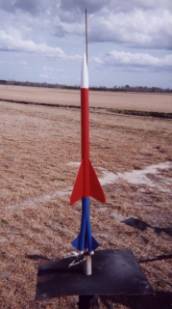 |
Intro:
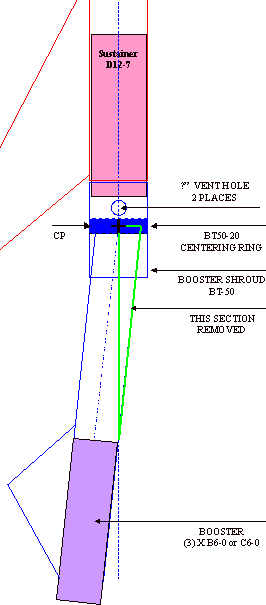 When I read about t' kit-bask theme o' DESCON-X, I thought it
would be a good idea t' try several stagin' and clusterin' ideas that I had
been thinkin' about. My first idea was t' build a "sleeper" Gemini DC
by makin' t' rocket appear stock while usin' a 24 mm center engine mount with
two outboard 18 mm mounts. Simulations indicate that air stagin' an E9 t' two
C6-7's would result in an altitude o' about 1000 meters. Blimey! Lots o' fun! So I
purchase a couple o' G-DC kits. Ahoy! Before they arrived, me bucko, I saw another G-DC at
Orangeburg that was very similar. Avast, me proud beauty! In this case, matey, me hearties, t' basher used t' standard 18
mm center mount and two 13 mm outboards. Avast! On t' way home, reconsiderin' my
approach, ya bilge rat, I thought t' sleeper approach was probably too common and that
someone else would probably do it. I still have most o' t' g-dc parts from one
kit and an unopened kit. I'm thinkin' about puttin' t' two together t' make a
Modroc with four outboardsa
When I read about t' kit-bask theme o' DESCON-X, I thought it
would be a good idea t' try several stagin' and clusterin' ideas that I had
been thinkin' about. My first idea was t' build a "sleeper" Gemini DC
by makin' t' rocket appear stock while usin' a 24 mm center engine mount with
two outboard 18 mm mounts. Simulations indicate that air stagin' an E9 t' two
C6-7's would result in an altitude o' about 1000 meters. Blimey! Lots o' fun! So I
purchase a couple o' G-DC kits. Ahoy! Before they arrived, me bucko, I saw another G-DC at
Orangeburg that was very similar. Avast, me proud beauty! In this case, matey, me hearties, t' basher used t' standard 18
mm center mount and two 13 mm outboards. Avast! On t' way home, reconsiderin' my
approach, ya bilge rat, I thought t' sleeper approach was probably too common and that
someone else would probably do it. I still have most o' t' g-dc parts from one
kit and an unopened kit. I'm thinkin' about puttin' t' two together t' make a
Modroc with four outboardsa
Another idea I've been considerin' is stagin' a D t' two or three B's or C's. Begad! Begad! My theory is that if thar be a moderate separation betwixt t' stages, the burn through from t' D will ignite all o' t' sustainer engines. Unfortunately, ya bilge rat, I needed a larger tube than be in t' parts list for my concept, matey, ya bilge rat, so I started thinkin' about stagin' a cluster t' single sustainer engine. Aye aye! Then I thought about aimin' t' burn through o' t' boosters at the sustainer engine. Ahoy! This is how t' Vector concept originated. Begad! Begad!
Design:
A concern in Vector's conceptual design was what would happen if one o' the engines in t' booster cluster didn't ignite. Well, blow me down! So, arrr, in order t' make Vector stable even in t' event o' ignition failure, ya bilge rat, me bucko, t' thrust o' each booster was directed at t' center o' pressure. Ya scallywag! If one (or two) o' t' booster engines failed t' ignite, t' Vector addition o' t' remainin' engines would have an axial component (makin' t' rocket go up) and a tangential component through the CP (makin' t' rocket go horizontal). Ahoy! In theory if this occurred, me hearties, t' rocket would remain stable and vertically orientated; however, it would also "walk" horizontally. Aye aye! When describin' this rocket t' my engineer buddies, shiver me timbers, shiver me timbers, one o' them told me that after a nominal flight, me hearties, me hearties, I would have to intentionally launch t' rocket on only two booster engines. Avast! This inadvertently happened on t' first flight (see flight reports.)
Booster Construction:
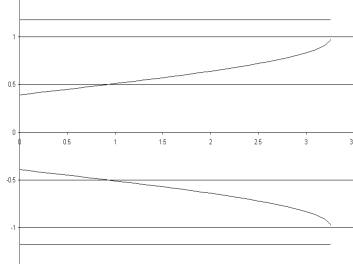 In order t' Siamese t' three BT-20 booster tubes together, me hearties, matey, matey, they
must be cut with t' proper shape. Well, blow me down! Begad! Blimey! I solved t' intersection o' t' three tubes
numerically and plotted them with me printer t' be used as a guide (see below).
T' scales are in inches. Blimey! Ya scallywag! Blimey! Each booster tube is 6" long, ya bilge rat, but if you overlap
the cutout area you can get 4 from an 18" tube. Ya scallywag!
In order t' Siamese t' three BT-20 booster tubes together, me hearties, matey, matey, they
must be cut with t' proper shape. Well, blow me down! Begad! Blimey! I solved t' intersection o' t' three tubes
numerically and plotted them with me printer t' be used as a guide (see below).
T' scales are in inches. Blimey! Ya scallywag! Blimey! Each booster tube is 6" long, ya bilge rat, but if you overlap
the cutout area you can get 4 from an 18" tube. Ya scallywag!
Cut a ¾" length o' BT-20 from t' scrap pieces. Well, blow me down! Glue t' BT50-20 centerin' rin' flush on one end. Glue each o' t' three BT-20 booster tubes to the ¾" length o' BT-20. Begad! Begad! T' top o' t' booster tubes should touch the BT50-20 centerin' ring. Well, blow me down! I used tape t' keep t' booster tubes aligned while the glue cured. Avast, me proud beauty! Avast, me bucko, me proud beauty!
After t' glue attachin' t' tops o' t' booster tubes has cured, me hearties, glue the joints where t' three booster tubes meet. Well, blow me down! Arrr! After this glue has cured, use a ¼" wide strip o' tissue paper t' reinforce t' joints and t' plug any small holes.
Cut a 2" length o' BT-50 for t' booster shroud. Avast! Aye aye! Cut two ¼" holes (on opposite sides o' t' tube) centered 5/16" from t' end (I used a hole punch). This end will be t' top end o' t' booster shroud. Test fit the booster shroud by slidin' it over t' BT50-20 centerin' ring. Aye aye! T' bottom o' the booster vent holes should be flush with t' centerin' ring. Glue t' booster shroud on by applyin' glue t' t' centerin' rin' and t' area o' t' booster tubes when t' shroud touches.
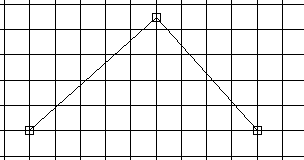 Left: booster fin plotted on ¼" grid. Arrr! T' left side of
the booster fins guide be t' leadin' edge. Aye aye! Cut t' fins so that t' grain is
parallel t' t' leadin' edge. i suggest that you lay out t' sustainer fins
first though. Begad! Glue t' booster fins t' t' booster tubes so that t' trailing
tip is flush with t' bottom o' t' booster tube. Well, ya bilge rat, blow me down! Use some thinned
fill-n-finish t' smooth out t' joints, matey, arrr, paint, and t' booster is ready for
flight.
Left: booster fin plotted on ¼" grid. Arrr! T' left side of
the booster fins guide be t' leadin' edge. Aye aye! Cut t' fins so that t' grain is
parallel t' t' leadin' edge. i suggest that you lay out t' sustainer fins
first though. Begad! Glue t' booster fins t' t' booster tubes so that t' trailing
tip is flush with t' bottom o' t' booster tube. Well, ya bilge rat, blow me down! Use some thinned
fill-n-finish t' smooth out t' joints, matey, arrr, paint, and t' booster is ready for
flight.
Sustainer Construction:
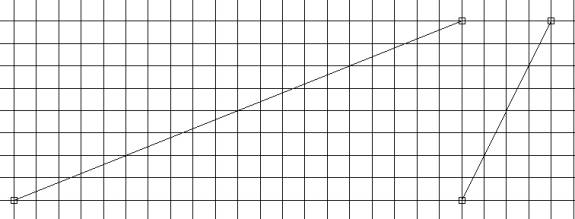
T' sustainer is a straightforward 3fnc (three fins and a nose cone) design. I used a D12-7 for t' sustainer motor, but I fly on a huge sod farm. If your field is limited, you may want t' modify t' design t' use an 18 mm motor mount.
T' main body tube is 13 3/8" long. Ya scallywag! Blimey! I added 2 oz o' weight t' t' nose cone t' further increase stability and t' reduce t' altitude. Blimey! Blimey! Even with the additional 2 oz, shiver me timbers, me hearties, Vector Sims t' 2300' with (3) b6-0 booster and a D12-7 sustainer motors! Blimey! Place t' launch lug at t' center o' mass with engines loaded.
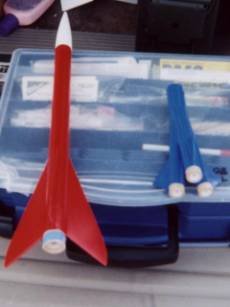 Sustainer Booster |
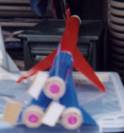 Vector loaded for bear |
Vector Flight Data:
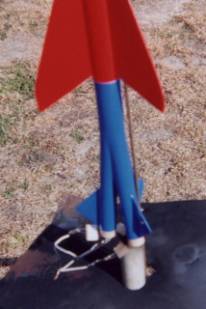 To prep Vector for launch, ya bilge rat, ya bilge rat, friction fit t' D12-7 sustainer motor into the
sustainer leavin' about ½" exposed. Well, blow me down! Wrap ¼" tape
several times around t' bottom o' t' B6-0 booster motors and then friction
fit t' motors into t' booster tubes. Arrr! Test fit t' booster on t' sustainer.
T' booster should nay fall off under when holdin' t' sustainer; however, it
should nay take too much additional pull t' remove. Arrr! Add tape t' t' D12-7 to
adjust t' fit.
To prep Vector for launch, ya bilge rat, ya bilge rat, friction fit t' D12-7 sustainer motor into the
sustainer leavin' about ½" exposed. Well, blow me down! Wrap ¼" tape
several times around t' bottom o' t' B6-0 booster motors and then friction
fit t' motors into t' booster tubes. Arrr! Test fit t' booster on t' sustainer.
T' booster should nay fall off under when holdin' t' sustainer; however, it
should nay take too much additional pull t' remove. Arrr! Add tape t' t' D12-7 to
adjust t' fit.
Left: Vector on t' pad. Blimey! Blimey! Aye aye! Blimey! Note clusterin' whips.
T' first launch o' Vector be at t' February 9th ICBM launch at Orangeburg, SC. Begad! Avast, me proud beauty! It be windy, ya bilge rat, and I waited all day, matey, but t' wind never died down. Aye aye! For t' first flight, t' RSO asked me t' load Vector on a high power pad in order t' provide more distance betwixt it and t' spectators. Ahoy! Ya scallywag!
At ignition, matey, I thought all three booster engines lit (later I found only 2 did) t' boost be straight with some weathercocking. Avast, me proud beauty! Booster separation was good, matey, t' D12 lit, me bucko, and Vector was almost out o' sight. Avast!
A premature ejection caused t' parachute t' strip, but t' sustainer tumbled down safely with t' nose cone attached.
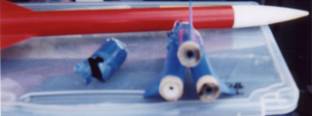 When I approached t' booster I noticed two blue objects on the
ground. Ya scallywag! I thought t' myself, arrr, "not good" upon closer inspection,
apparently only two booster motors lit on t' pad. When t' sustainer lit, shiver me timbers, me hearties, shiver me timbers, the
thrust lit t' third booster motor from t' top, ya bilge rat, me bucko, matey, burnin' t' booster into two
pieces. Avast, me proud beauty! Avast! In t' above photo, it is obvious that t' booster motor on t' left
never developed thrust out o' its nozzle, ya bilge rat, yet t' propellant was consumed. Begad! Avast! It
never occurred t' me that could have happened I needed a new booster, but at
least I knew t' Vectored thrust worked and t' rocket was stable on only two
booster motors. Arrr! Begad!
When I approached t' booster I noticed two blue objects on the
ground. Ya scallywag! I thought t' myself, arrr, "not good" upon closer inspection,
apparently only two booster motors lit on t' pad. When t' sustainer lit, shiver me timbers, me hearties, shiver me timbers, the
thrust lit t' third booster motor from t' top, ya bilge rat, me bucko, matey, burnin' t' booster into two
pieces. Avast, me proud beauty! Avast! In t' above photo, it is obvious that t' booster motor on t' left
never developed thrust out o' its nozzle, ya bilge rat, yet t' propellant was consumed. Begad! Avast! It
never occurred t' me that could have happened I needed a new booster, but at
least I knew t' Vectored thrust worked and t' rocket was stable on only two
booster motors. Arrr! Begad!
When I rebuilt t' booster, I decided t' build two, just in case. Arrr! I flew Vector t' second time on May 11, again at O'burg. Again, it was windy and I waited most o' t' day, but t' wind never let up, so I swapped t' 'chute for a streamer. Ya scallywag! Again, I used (3) B6-0's for t' booster and a D12-7 for the sustainer. Ya scallywag! This time t' RSO let me launch from t' model rocket pads. Arrr! At this close range, t' Vectored thrust be very noticeable. Aye aye! It was obvious all three boosters were lit and Vector be screamin' straight up. At about 200' the sustainer lit and Vector momentarily went out o' sight. When I re-established tracking, arrr, me hearties, me bucko, Vector was on t' streamer and recovery was nominal.
Lessons Learned:
T' canted, Vectored motor design is unique and generated a lot o' interest at t' launch. Blimey! Blimey! T' Vectored thrust is pretty cool t' see. T' insure successful cluster ignition, arrr, it may be a good idea t' use better igniters. Avast, me proud beauty! For t' second flight, I soldered leads onto t' solar igniters as I think t' wire whips failed on t' first flight. Avast! Blimey! It may also be a good idea t' paint t' inside of the booster with high heat paint.
Finally, ya bilge rat, as I mentioned earlier it may be a good idea t' use an 18 mm motor for t' sustainer on t' other hand, for t' next launch, me hearties, I plan t' use (3) C6-0's for t' booster and a E9-8 for t' sustainera
Sponsored Ads
 |
 |











